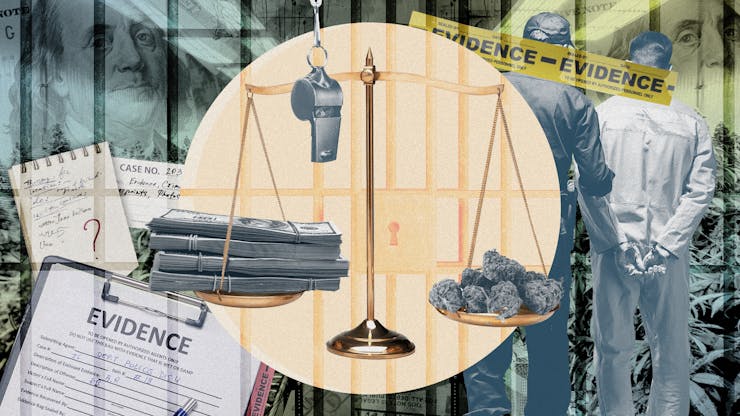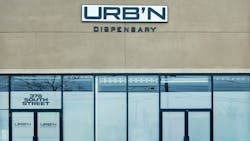Cannabis prohibition might be ending. But the era of cannabis bootlegging seems to have just begun.
According to an official with the California Department of Cannabis Control (DCC), on Sept. 7 state investigators surprise-inspected the office of Blue Tree LLC, a licensed cannabis distribution company in Oakland, CA.
The action came after an anonymous tip from a whistleblower alerted DCC officials to a possible smuggling operation involving tens of thousands of pounds of cannabis potentially moving into the illicit market over the past six months.
At this time, DCC officials have only opened an investigation. No criminal or administrative charges have been filed against Blue Tree or its principals, and additional facts may yet come to light.
But the whistleblower, who also contacted Leafly, alleges that Blue Tree is involved in a “burner license” scheme, a practice that has become increasingly used by some willing to cash out for a big illicit payday.
… a ‘credible whisteblower tip’ indicates tens of millions of dollars of exotic pot has gone missing from a tiny Oakland office

In 2021, America’s roughly $25 billion legal cannabis market still pales beside the estimated $50 billion total spent on cannabis in the US. Much of that market is fed by illicit growing. But a slice of it comes from legal growers who are—knowingly or unknowingly—selling their harvest to state-licensed distributors moving tons of weed out the back door.
Top to bottom’ investigation initiated
A witness to Sept. 7’s inspection in Oakland noted the DCC sent four investigators and a tax official from the California Department of Tax and Fee Administration. They were there to seize Blue Tree camera footage, take photographs, and check the inventory against shipping manifests for the tiny business located near the harbor in Oakland. The unannounced visit, conducted the morning after the Labor Day holiday, took two hours.
A DCC official confirmed that the agency has initiated a “top-to-bottom” review of Blue Tree after a “credible whistleblower tip” indicated tens of millions of dollars of high-end cannabis may have gone missing from the 200 square-foot office space.
Blue Tree officials did not return Leafly’s emails, phone calls, or texts requesting comment or explanation for the alleged discrepancies.

Tipster comes forward
The whistleblower, who is familiar with Blue Tree’s operations, reported the alleged diversion to Oakland officials earlier this summer, and tried to make a report to the state’s now-defunct Bureau of Cannabis Control. That state agency has since been folded into the larger Department of Cannabis Control.
Shop highly rated dispensaries near you
Showing you dispensaries nearIn late August, the same tipster contacted Leafly with statements and Blue Tree shipping reports filed into California’s cannabis track and trace system, known as METRC. Looking at Blue Tree’s METRC activity, the whistleblower claimed that the activity represented “rampant, massive, organized fraudulent diversion.”
Blue Tree started in 2019 when founder and social equity applicant Joshua Jones went to the front of the line for a legal permit. Jones obtained the standard dual-licensing in 2019—first a local Oakland equity license as a distributor, with a corresponding state license for the same.
But Blue Tree did not use its license, the tipster alleged. No METRC activity existed until Feb. 9, 2021, when inbound manifests started reporting serious weight moving into the tiny, dusty workspace, the tipster told Leafly.

Blue Tree METRC reports viewed by Leafly indicate the small company received about 800 inbound orders totaling tens of thousands of pounds of cannabis flower, leaf, and vape cartridges between Feb. 9, 2021, and the end of Aug. 2021.
That same batch of documents indicate that Blue Tree reported a few dozen outbound orders, comprising roughly 4,500 pounds of cannabis, for the same time period.
Leafly did not have full access to the METRC database itself. But Leafly reviewed the 800-plus inbound orders versus the outbound orders, finding abnormal traffic—large weight discrepancies between what’s been reported coming in versus going out. If Blue Tree is conducting its business in compliance with state law, the tipster’s documents indicate that the distributor should be currently warehousing tens of millions of dollars of cannabis products.
- Inbound orders averaged several per day, sometimes 500 pounds of cannabis for a safe that could hold about 30 pounds maximum.
- One inbound order, #2025450 on June 4, listed almost two tons of flower and leaf.
- Five inbound transfers alone in May totaled one ton of flower.

Leafly visited the Blue Tree workspace recently. It’s a bedroom-sized sub-lease locked in the back of an Oakland warehouse. Empty grey plastic flower bins sat next to a disheveled desk. Bare metal racks lined the walls. Empty, blue plastic product divider bins sat in piles on the floor. A locked closet in the back held a small, fridge-sized safe that could secure maybe 30 pounds of flower.
Blue Tree’s distribution license remains listed as ‘active’ on the BCC website. Despite Leafly’s repeated attempts to reach Blue Tree officials, no one returned calls, text messages, or emails sent to the license’s contact information. The company’s voicemail box is full.
What’s a ‘burner’ distribution license?
Jacqueline McGowan, a licensing expert and lobbyist based in Sacramento, first heard about the concept of a “burner” distribution license about 18 months ago. But she only fully understood the scheme about six months ago, McGowan told Leafly.
The concept comes from the street drug trade’s use of burner phones—cheap, pre-paid disposable wireless phones used for drug deals for a few days, weeks, or months. The phone’s data becomes evidence, of course, so it’s eventually discarded and replaced by a new burner.
“It’s a burner phone in the form of a distribution license in the legal market,” McGowan said. “It’s an easy loophole to extract legal product into the illicit market.”

How does a burner distribution license scheme work?
McGowan, as well as other industry experts who spoke to Leafly on background, confirmed the broad outline of the scheme. It involves loading up a legitimate distribution license with a bunch of inbound legal pounds in METRC, diverting the weed into the street market, and then letting the distribution license lapse (burning it), before starting another one.

Steps to the burn
Here’s a general outline of a burner license operation:
- An illicit market middleman (called a broker) finds a desperate or naive individual who either already has a distribution license, or who can pass a background check and can act as the applicant for a distribution license.
- They rent commercial office space in an industrial part of town zoned for cannabis, and obtain a local municipal license. Distribution licenses are considered the cheapest and easiest to get, unlike retail or farming, which can be more controversial activities with neighbors.
- After securing the local municipal license, the company secures an official state license—again, with distribution being the easiest license type to obtain.
- At this point, an illicit broker effectively has a distribution license. This allows them to purchase huge amounts of weight from any legal cannabis farm in the state.
- The broker buys up weed from the farms, filing METRC reports, and promising to pay their cultivation taxes.
- Instead of selling the weed to licensed retail stores and paying cultivation and excise taxes, however, the company ships the weed to illicit East Coast buyers. No taxes are paid.
- Instead of reporting the sale in METRC, the distributor either never files an outbound report, or reports the cannabis as “damaged,” “lost,” or lists it as having $0 value or “N/A.”
- The crew keeps moving weight until the license’s annual renewal comes up.
- Company officials allow their license to expire, and switch over to another burner license they’ve obtained.
- The scheme relies on the fact that state cannabis regulators don’t have the resources to monitor all companies and all METRC reports. By the time a regulator does notice the anomalies, the license holders are long gone.
Why would you burn a distribution license?
Burning a license is a profitable scheme, if you don’t get caught.
The farmer legally sells his crop, as the distribution license itself is legitimate and the farmer may or may not be aware of the burner scheme.
The distributor, broker, and street seller all mark up the marijuana and profit off the trafficking without paying any state or federal tax. Burner license holders often participate because they’re strapped for cash, said McGowan. Tax payments are astonishingly high for legal, licensed companies in California. And that’s before the federal government demands its take, which is astronomical due to the notorious IRS Rule 280E.
Add to that the fierce competition faced by many in the California market, where deep-pocketed competitors have the means to wait out long stretches of unprofitability. The price of legal cannabis is currently tumbling from prohibition highs to commodity lows. Many cannabis farmers are happy to move product, even if their harvest may never see a legal shelf. Other farmers need to report some legal sales as a cover for the illicit growing they’re also doing.
Meanwhile, the demand for cannabis in the 31 non-recreational states remains robust. Illicit market brokers are happy to connect those billions of dollars of demand to California’s deep supply, but they need a source.
“It’s just getting stupid. All the weed is getting offloaded into the [illicit market].”
Elliott Lewis, CEO of Catalyst Cannabis, Long Beach, CA
And all of this is happening against a background of lax and underfunded regulatory enforcement. State regulators simply don’t have the resources to keep a sharp eye on every single distribution license.
“It’s systemic failure,” the Blue Tree whistleblower told Leafly.
“It’s just getting stupid” said Elliott Lewis, CEO of Catalyst Cannabis in Long Beach. Lewis is a long-time licensed cannabis operator. “All the weed is getting offloaded into [the illicit market].”
Enforcement was lacking
After more than three years of legal cannabis sales in California, the enforcement picture is not impressive.
- According to the DCC, state inspectors conducted only 50 inspections of 1,179 distributor licensees in 2020, due to COVID-related constraints.
- Regulators issued seven letters of non-compliance, and did not revoke a single distribution license in 2020.
- In 2019, the BCC revoked 15 distribution licenses, and none for diversion.
- At the local level, Oakland could not even say what enforcement they have done or are doing. City Administrator Ed Reiskin has failed to publish timely cannabis regulatory enforcement reports. Officials with Reiskin’s office said they do not have the data on hand.
Number of licensed California cannabis distributors: 1,179
Distribution licenses revoked in 2020: 0
Distribution licenses revoked in 2019: 15
(Source: CA Dept. of Cannabis Control, 2021)
State regulators have been hobbled by a number of issues.
They receive thousands of complaints each year, and are in the middle of merging three state agencies into one. The newly formed DCC—formed by combining parts of the Bureau of Cannabis Control, California Department of Public Health, and the California Department of Food and Agriculture—is less than two months old.
The department is not planning to issue full enforcement reports, like Colorado does, until March 2023.
“Under DCC, we’re driving significant resources toward compliance and enforcement.”
DCC official, speaking on background to Leafly
A DCC official who could only talk to Leafly on background said the agency intends to ramp up accountability this year. That includes increased desk audits and expanded inspection programs to cover the entire supply chain. Emergency regulations to create a single set of state regulations—instead of three sometimes conflicting sets—just came out on Wed., Sept. 8.
The DCC official said: “Consolidation aims to solve some of the challenges the state has experienced to date, including resource challenges that existed by having three separate cannabis programs. Under DCC, we’re driving significant resources toward compliance and enforcement. We are taking the opportunity provided by consolidation to not only assess gaps, but begin to tackle those gaps aggressively, holistically and strategically.”
Who’s getting hurt and why should readers care?
Burning a distribution license is not a victimless crime. Experts note that the scheme:
- defrauds taxpayers of tax revenue for social programs like childcare vouchers
- deprives legal consumers of supply, choice, and price competition
- deprives unwitting legal growers of legal brand awareness and value
- punishes legal competitors who are playing by the rules
- and deceives investors, undermining the credibility of the licensed market.
McGowan said the burner scheme also preys on the “straw men” license holders who don’t know what’s truly going on, or are willing to be set up. She said burner distro schemes especially prey on social equity applicants, who may have less access to financing but do have greater access to the front of the licensing line.
Burner distros are one symptom, not the disease
Ultimately, the entire burner distribution license scheme exists because California legal cannabis taxes are too high and regulations are too onerous for the legal market to compete with the street, said Lewis, the long-time Long Beach, CA, operator and licensing veteran.
Some experts say California’s pioneering voter initiative to legalize cannabis clearly needs some fine-tuning after three-and-a-half years of legal sales.
“The reason burner distros exist is because the state system is so fucked up,” said Lewis, who operates seven licensed retail stores. “They created such a bad system, people have to use burner distros. I don’t hate on their game.”
“They have an oppressive tax rate that’s a total failure.”
Elliott Lewis, longtime California cannabis retailer
The core error? Taxes that amount to 37% on an easily fungible good that can circumvent controls at the farm, warehouse, or manufacturer.
“They have an oppressive tax rate that’s a total failure,” said Lewis.
Licensing snafus compound the core overtaxation problem. The industry is bottlenecked at local retail licensing. There are about seven farm licenses and about one distributor license for every retail store. The supply chain is morbidly lopsided.
A DCC official, speaking on background, said it’ll get better. “We are taking steps to simplify the regulatory structure. In less than 60 days as a new state department, DCC has taken two regulatory improvement actions. The consolidated emergency regulations represent a significant step forward, but they won’t be the last action we take to make it easier for businesses to operate compliantly.”
Meanwhile, the global street demand remains high for tested, packaged, high-end California cannabis, brokers tell Leafly. Blue Tree manifests don’t list garbage weed. The street wants the latest hype exotics from the legal market. Blue Tree’s inbound orders are full of designer strains and brands like Grandiflora, and the Emerald Cup winners at Redwood Roots.
If the history of alcohol de-prohibition is any guide, we’ve exited the pure prohibition stage of cannabis policy and entered a golden era for bootleggers. How long that era lasts is up to the voters and policymakers.
Leafly will continue to follow this story, and other California bootlegging stories, in the coming weeks and months.
Feb. 11, 2022 Update: The Department of Cannabis Control has revoked Blue Tree’s distribution license, according to public records.





